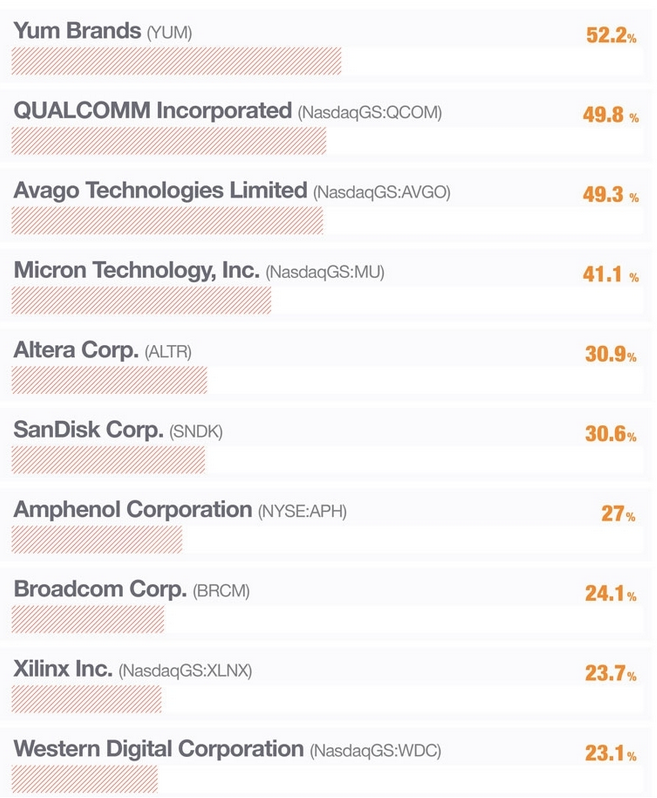President Obama told Reuters Monday he has "raised directly with President Xi [Jinping]" concerns about pending Chinese legislation that requires technology companies provide the Chinese government "backdoor" access to encrypted files and store data on Chinese users in China.
奥巴马总统周一告诉路透社,他直接向习主席提出,对中国即将立法要求科技公司向中国政府提供"后门"接口以监测中国用户的加密文件和存储文件,表示关注。
The law, which is expected to be adopted by China's parliament in the near term, "would essentially force all foreign companies, including U.S. companies, to turn over to the Chinese government mechanisms where they can snoop and keep track of all the users of those services," Obama said. "We have made it very clear to them that this is something they are going to have to change if they are to do business with the United States."
这部法律,被认为将会在人大近期通过,"将实质上强迫所有外国公司,包括美国公司,向中国政府提供一个机制来窥探和追踪他们所有的用户",奥巴马说。"我们明确对中国人表示,如果他们想跟美国公司做生意,他们就必须改变这一点。"
President Obama's response to what China calls an anti-terrorism law is just the latest escalation in a series of policy disputes over cybersecurity and related issues initially triggered by Edward Snowden's 2013 leak of classified NSA surveillance programs. The Justice Department's indictment of five Chinese military officers in May 2014 for allegedly stealing trade secrets was another major event in what Reuters calls "a major irritant in U.S.-China relations."
奥巴马总统对中国所谓反恐法的反应,正是2013年斯诺登泄密事件引爆的一系列对于互联网安全相关事宜的政策纠纷的最新体现。2014年5月美国法律部门以涉嫌偷窃贸易机密起诉五名中国军官是另一起重大事件,被路透社描述为"严重刺激了美中关系"。
Starting last summer, Chinese government agencies were ordered to use home-grown technologies vs. those made by Microsoft (MSFT), IBM (IBM), Cisco (CSCO) and Oracle (ORCL).
自去年夏天起,中国政府部门被命令使用本土研发的产品以取代微软、国际商用机器公司、思科以及甲骨文提供的产品。
"To resist the naked Internet hegemony, we will draw up international regulations, and strengthen techno logy safeguards, but we will also severely punish the pawns of the villain," China's The People's Daily s aid last June.
“为了阻止赤裸裸的网络霸权,我们将根据国际通行的规则加强技术安全措施,同时我们也将严惩恶意违规行为”,人民日报去年6月报道。
In addition. Western automakers General Motors (GM), Mercedes, Audi and Volkswagen were targeted for egedly violating Chinese antitrust regulation while local offices of Microsoft and its China Accenture pa rtner were raided in August.
不止如此,西方汽车制造商通用、奔驰,奥迪和大众也被中国反歪断法列为目标,同时微软中国和它在中国合作伙伴埃森哲咨询的办公室去年8月被搜査。
Generally speaking, most investors have looked at these US-Sino cyber security issues -- if they're even paying attention -- as mainly a political sideshow for local Chinese consumption or, at worst, a mere rhetorical battle between the world's first- and second-largest economies. But China has both national security and economic interests behind its "Buy China" campaign and investors ought to start paying more attention to these developments, as I wrote here in August.
总体而言,大多数投资者把这些美中互联网安全问题——如果他们关注这事的话——看作主要是一场中国国内的政治游戏,最多也只是一场世界第一大和第二大经济体之间的嘴仗。但是中国在"支持国货"运动的背后有国家安全和经济方面的利益,所以投资者应该更加注意这件事的发展,正如我去年8月份专栏文章里所写的那样。

S&P 500 companies with highest percentage of sales in China, based on those firms that disclosed such information …
标普500公司里中国销售额占比最高的公司,基于愿意提供此类信息的公司的披露
U.S. companies aren't forced to break-out their revenue by any particular geographical segment; as such, many firms don't specifically mention China. According to S&P Capital IQ, only 40 S&P 500 companies disclosed specific figures on China sales in their fiscal 2014 annual reports, with the average proportion of full-year revenue at 16.3%. Based on that data, we compiled a list of the S&P 500 companies with the greatest share of sales in China, of those that disclosed such information, at left. Qualcomm, for example, which last month agreed to pay a $975 million fine to settle allegations it violated the country's antitrust regulations, generated nearly 50% of its fiscal 2014 revenue from China. (Qualcomm shares have risen since the settlement was announced since it removed "uncertainty" over its China legal issues.)
美国公司并未被强令必须分具体地区来提供收入报表,所以很多公司并没有在财报里提到中国的收入到底有多少。根据S&P Capital IQ(财经信息提供商)提供的资料,标普500公司里面只有40家在其2014年年报中披露中国地区的具体销售额,中国平均在整体销售额中占16.3%。根据这份数据,我们编辑了一份标普500中披露相关信息的公司里面,中国销售额占比最大的公司列表。以高通为例,其上个月同意支付9.75亿美元的罚金以解决涉嫌违反中国反垄断法的问题,这将近高通2014年中国收入的一半。(在与发改委和解的消息公布后,高通股票大涨,因为其在中国面临的法律问题的不确定性消除了)
The bottom line is, naturally, the bottom line: Even as the pace of economic expansion slows, China is s till viewed as a huge "growth opportunity" for U.S. multinationals and there's real money at risk if Chin a closes its markets — or makes it cost prohibitive for foreign firms to enter (or stay) in the world's most-populous nation.
:即使经济扩张减速,中国仍然被美国跨国公司看作一个巨大的増长机会。中国如果真的关上大门^或者 使得外国公司进入/留在这个世界上人口最多的国家的成本变得无法接受,目略是真金白银时员失。
"Western firms know they've got to be in China because the market is expanding so rapidly but playing by Chinese rules is often difficult," says Wharton Dean Geoffrey Garrett. "It's not trivially easy to operate in the Chinese market but the upside is incredibly high."
"西方公司知道,中国市场增长如此之快,他们必须待在这里,但照中国的玩法这并不容易",Wharton Dean Geoff rey Garrett说。“在中国市场运营不会一帆风顺,但是回报难以置信的高”。
Garrett believes the Chinese market is simply too big for Western firms to ignore, even if it's becoming more challenging to operate in the Middle Kingdom. Five years ago, Apple was assemblying phones in China for exports, he notes; now sales in China account from 17% of its revenue. Still that's not to suggest there isn't plenty for U.S. firms and investors to worry about, especially as 2014 marked the first time China's investments abroad outstripped inward direct foreign investment.
Garrett相信中国市场太大以至于西方公司不可能无视她,即使在这个中央帝国运营变得越发有挑战性的情况下。五年前苹果在中国装配手机出口,现在中国地区为苹果贡献了17%的收入。这并不是说美国公司和投资者的没有什么可担心的,尤其是2014年中国第一次对外投资超过引进外资。
"I don't want to be pollyanna-ish about China...but when we see the protectionism of Internet in China it tends to take our eye off something: the scale and innovativeness of Chinese tech companies," says Garrett, who has extensively studied China's economic rise and was previously President of the Pacific Council on International Policy in Los Angeles. "For 10 years the Chinese strategy has been to grow companies that are not only Chinese champions but global champions and tech looks like a good place for the Chinese to focus."
"对中国我并不是过分乐观...但是当我们关注中国在互联网上体现出来的贸易保护主义时,往往忽略掉了中国科技企业的规模和创新能力",Garrett说。他广泛研究中国的经济崛起,并且是洛杉矶太平洋国际政策委员会的前主席。"中国的10年策略是培育不仅在中国领先更在国际上领先的企业,而技术领域看上去正是中国可以集中精力的地方"。
It looks 'good' unless you're trying to compete with them on an uneven playing field, of course.
这看上去很不错,除非你正好想与这些中国公司竞争,当然了,尤其是要在一块不平坦的场地上竞争的话。













